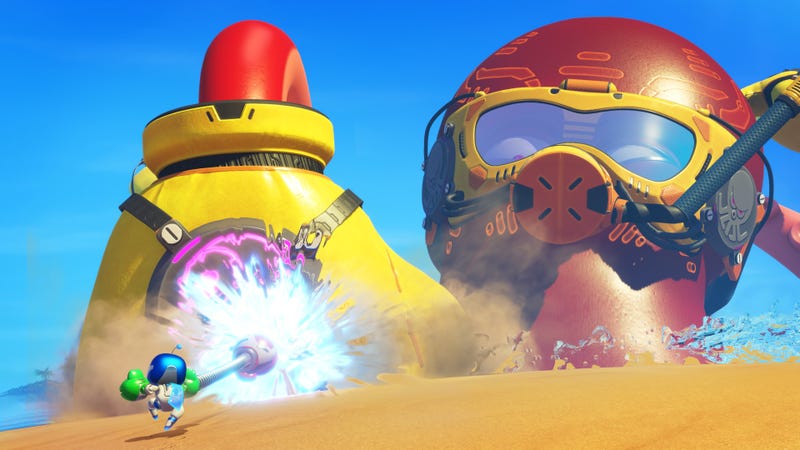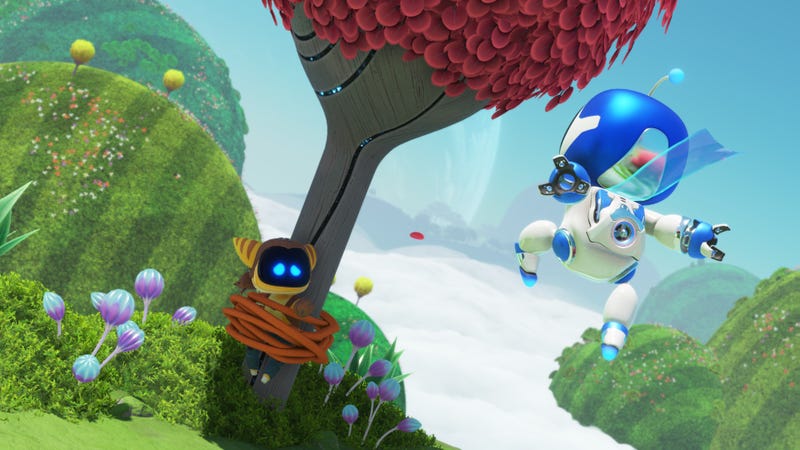I cried at the end of Astro Bot. I recognize this isn’t indicative of much beyond my sentimentality, but I thought it was a crucial tidbit to underscore something else, something important about PlayStation’s excellent new platformer. It really is, more than anything else, a celebration of the consoles and games that shaped me, and likely many of you, too. It is so completely possessed with joy and teeming with the life of everything that PlayStation has meant to people over the years. It is also a brilliant platformer in its own right, stuffed full of ideas that make it seem like Asobi Team is just getting started in this utterly endearing franchise. For all its charms and wonders, however, there’s also a slightly melancholy feeling that Astro Bot, which secondarily serves as a kind of museum of PlayStation’s history, is putting that legacy and the spirit of innovation that defined it under glass to be gazed upon and appreciated as a relic of yesterday, rather than to infuse and electrify the games of today and tomorrow.
Astro Bot, a sequel to the free PS5 pack-in title Astro’s Playroom, finally smashes together the premises of both that tech-demo-turned-game and its VR predecessor, Astro Bot: Rescue Mission, into a singular powerhouse. In it, you play as the titular hero, who darts between worlds saving many similar robots, and even some V.I.Ps while they’re at it. These V.I.Ps are often characters from across PlayStation’s history, but in adorable robot form. Think of the mascots and franchises that you and I might’ve grown up with, like Sly Cooper. He’s there, and so are about 149 other winks, nudges, and footnotes spanning the brand’s nearly 30 years of existence.
I absolutely adore every bit of it, and it certainly doesn’t hurt that my entire life, which has been spent playing games, fits neatly within those 30 years. Astro Bot, however, is much more than just a paean to nostalgia. This is a genuinely stellar 3D platformer. About pitch perfect, honestly. It doesn’t flesh out Astro Bot themself, who retains more or less the exact same moveset from the previous game, but it does blow up everything else around them. There are so many more levels split across numerous galaxies, and so much variety amongst them.
Some levels feature platforms and enemies that require charged spinning moves to operate or defeat, while others have glass floors that break away when you walk on top of them. And there are so many more deviously concealed robots to find on each mission, incentivizing players to dig deep on many of its incredible levels, which are such a blast to explore and move around in that you’ll naturally enjoy poking in each and every corner to see what might be lurking there.

True to the genre, there are even more collectibles in the form of puzzle pieces that unlock functions of the game and secrets that hide away even more challenges. The hub world, a crash site that doubles as a museum for all the collectible robots you find and the iconography of their respective games, basically contains its own Pikmin-like mechanics, allowing you to step on and climb atop some of your favorite characters. There’s so much more here than initially meets the eye, and every new layer of it that unfurls is magnificent.
The operative word in describing Astro Bot is simply “more,” and it thoughtfully expands without suddenly ballooning into a never-ending adventure. If you just blast through it, Astro Bot could very well be beaten in a single marathon session, and even if you’re breaking it up and savoring the game, it’ll still amount to about 10 hours, or a bit more if you’re really trying to find everything. I’m still hunting down some secrets and am just shy of all 300 robots while pushing 13-14 hours. It won’t last you forever, but I do believe that reasonable length helps turn Astro Bot into an instant favorite that I can feasibly revisit time and time again.
Across its 80 levels, Astro Bot is delightful in its simplistic brilliance. It riffs on many of the same biomes and tropes you’ve come to expect from a game like it, like desert, water, and ice environments, but confidently does so in its own style rather than outright aping its influences. Most missions begin with Astro Bot receiving a power-up that they will typically carry for the entirety of the level, such as a chicken-themed jump pack that only pushes them upwards, or a dog-themed one that shoots them forward. A clock can temporarily slow time, rendering platforms from plates and cutlery that a ghost will toss up, and my absolute favorite allows Astro to shrink to the size of a mouse, revealing levels tucked away within levels. In its most standout moments, which come at the end of every galaxy, Astro Bot temporarily transforms into blown-up tributes to PlayStation’s past, such as God of War and other titles I won’t dare spoil. If Astro’s Playroom was Team Asobi’s trepidatious first step into the genre, Astro Bot is a clear and confident leap forward.
While clearly borrowing from the framework of Super Mario Galaxy (an all-timer that should be more influential than it is), Astro Bot mostly turns familiar concepts into its own thing. The former game might’ve turned anti-gravity into a primary principle of its design, but here, Astro Bot tastefully deploys it in pockets where it makes sense to, even if they’re both ultimately galaxy-hopping space romps. It eschews most of the traditional power-ups one might think of, while throwing its own spin on the familiar ones, and pretty successfully charts its own course.
All the while, Astro Bot is further proof that the PS5 is a beast in the right hands. Much of the same haptic and gyro technology is back from Astro’s Playroom and repurposed for this grander adventure. Every little thing gives some kind of audio feedback or reverb from the Dualsense controller, which is obviously being put to work in this game.
Metal footsteps on similarly metallic surfaces have never clanged so resonantly. The sound and feeling of a zipper being pulled down has never been rendered so convincingly. The patter of rain on the umbrella that sprouts from Astro Bot’s head could convince someone there’s a downpour going on outside. The jokes about aging PS4s sounding like jet engines feel tame compared to the sound and rumble emanating from the Dualsense when Astro Bot revs up their similarly shaped speeder. Somehow, the world fits into this controller, which is noisy as all hell while playing. Despite that miniature cacophony, it’s a welcome feeling to be greeted by the gleeful sights, sounds, and sensations of Astro Bot’s joyful and childlike universe.
Given how Astro Bot turns even simple concepts such as an alien literally ripping apart a PS5-turned-spaceship into appealing and imaginative tableaux, I don’t see any reason why this series shouldn’t continue, free of the PlayStation branding that adorns every bit of its gorgeously rendered environs. As a matter of fact, I almost insist on it, given the uneasy feeling of all of the nostalgia that Astro Bot peddles. It features some truly deep pulls and references that had me guffawing at their inclusion, but it also doesn’t do all that much with the vast majority of the characters it features. Iconic figures of PlayStation’s past are often in appropriate locales, such as a certain set of characters from a historic horror franchise in a level themed around ghosts and haunted manors, but not every one of them gets their own tribute levels at the culmination of the game’s six respective galaxies, meaning that they’re mostly just there waiting for you to interact with them.

Their inclusion is cute, and should you unlock some of these characters’ associated memorabilia from the in-game gacha machine, they can be interacted with. More often than not, these interactions are easter eggs in and of themselves, such as the death animation of a certain PS2 platforming hero, but they don’t play much of a role beyond serving as eye candy in a self-contained area. As joyous as it is to be surprised by the beloved characters of my youth, it’s also all colored by the fact that they are mostly just here on display. The veneer of nostalgia fell away for me soon after this realization, as the crash site took on an air of “Look, but don’t touch.” Astro Bot is so many wonderful things, but between Astro’s Playroom and now this game, it is also increasingly PlayStation’s museum, where the brand will seemingly now hold the memories of all the brilliant things it used to be and keep them at a respectful distance from its present and future ambitions.
It also stings to know that Astro Bot and the brilliant team that so clearly loves this history and has historically made wonderfully inventive games is born from the refuse of another studio that used to be emblematic of what PlayStation once was. Japan Studio’s closure still hurts, and Astro Bot and its ingenuity softens things some, but not tremendously. In another timeline, Astro Bot is the crown jewel atop a heap of similarly ambitious titles from a slew of passionate developers who feel emboldened to make their wildest dreams come true. Right now, it’s landing as the wider cultural landscape craves a return to stability, as teams under PlayStation’s leadership seemingly cannibalize each other’s house styles and genres or have their live-service games outright pulled within weeks of launch, and fans and game makers alike cry out for a sense of normalcy after years of growing pains and tumult. Astro Bot celebrates a history of games and is a light in the darkness to be sure, but it increasingly feels like an outlier in gaming’s increasingly narrow future rather than the full-throated reprisal of what once was.
Astro Bot is a mighty game and so is its eponymous hero, but I don’t think either is likely to save the world or this industry. For what it is, though, Astro Bot is incredible, and that is worth celebrating here and now. I just can’t help walking away from the experience with a bittersweet taste in my mouth and a hope that someday soon, we don’t have to look to gaming’s past for the best bits of it all.
.

Leave a Reply